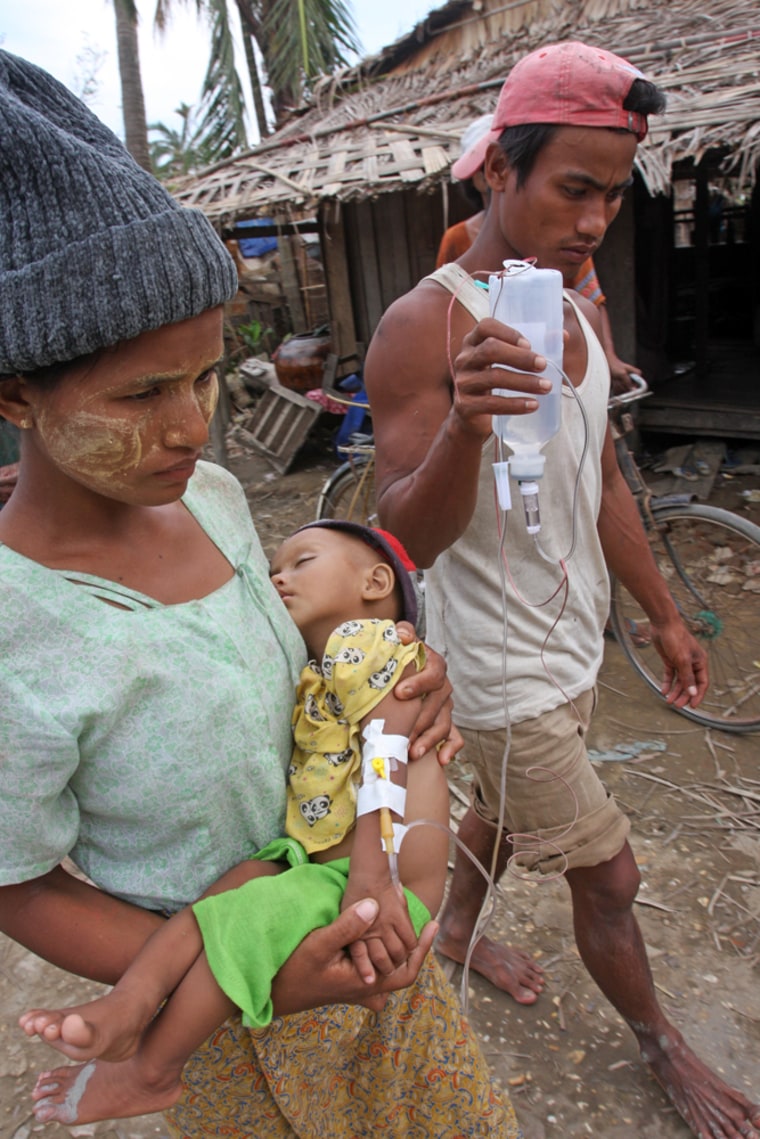Myanmar's junta said Sunday that it was prompt in providing relief to cyclone victims, an apparent response to global criticism over its handling of a disaster that left more than 130,000 people dead or missing.
Deputy Defense Minister Maj. Gen. Aye Myint made the comments in Singapore as authorities back in Myanmar pushed ahead with plans to open schools in several cyclone-battered areas Monday — a move that aid groups fear could put children in harm's way.
The country's military leaders broadcast warnings about the May 2-3 cyclone more than a week in advance and moved quickly to rescue and provide relief to the estimated 2.4 million survivors, Aye Myint told an international security conference.
"Due to the prompt work" of the military government, food, water and medicine was provided to all victims, he said.
"I believe the resettlement and rehabilitation process will be speedy," he added.
He spoke a day after human rights and aid groups criticized Myanmar for kicking cyclone survivors out of shelters and sending them back to their devastated villages.
Cyclone Nargis killed 78,000 people and left another 56,000 missing.
Some international aid agencies say they are still being blocked from sending foreign experts into the delta, despite the junta's pledge to open its doors to foreign aid workers. Other aid groups say their staffers are meeting survivors deep in the delta who have not received any help since the storm hit.
Aye Myint reiterated the junta's official stance of welcoming international aid.
"We would warmly welcome any assistance and aid which are provided with genuine goodwill from any country or organizations provided there are no strings attached," he said.
Shortly after the cyclone struck, the U.S., France and Britain sent warships loaded with relief supplies, but the Myanmar regime has refused to let them land, apparently fearing a foreign invasion.
Defense Secretary Robert Gates said Sunday in Singapore he will make a decision within "a matter of days" to withdraw the U.S. Navy ships from the coast of Myanmar, because "it's becoming pretty clear the regime is not going to let us help."
As a result, he said many more people will die, particularly those in areas that can only be reached by helicopters.
Gates on Saturday called Myanmar's rulers "deaf and dumb" over their refusal to accept outside help. He said Myanmar's rulers "have kept their hands in their pockets" while other countries sought to help cyclone victims.
The New Light of Myanmar newspaper, a government mouthpiece, on Sunday praised the response of country's leader, Senior Gen. Than Shwe, to the disaster.
"His loving kindness and goodwill for the people is much better than that which a parent has for his children," the newspaper said. "As a matter of fact, he is dedicating his life to a prosperous future of the nation's over 57 million population."
Than Shwe faced international criticism for waiting until two weeks after the storm hit to survey the damage and visit survivors in the delta.
In its struggle to return to normalcy, the junta plans to reopen many schools Monday in areas hit by the cyclone, though some were scheduled to reopen in July.
The United Nations Children's Fund says that more than 4,000 schools serving 1.1 million children were damaged or destroyed by the storm and more than 100 teachers were killed. As a result, the government plans to train volunteer teachers and hold some classes in camps and other temporary sites, UNICEF said.
Anupama Rao Singh, UNICEF's regional director, said that reopening schools in the delta Monday "may be too ambitious," since construction materials were still on the way and there was not enough time to rebuild schools and train new teachers.
